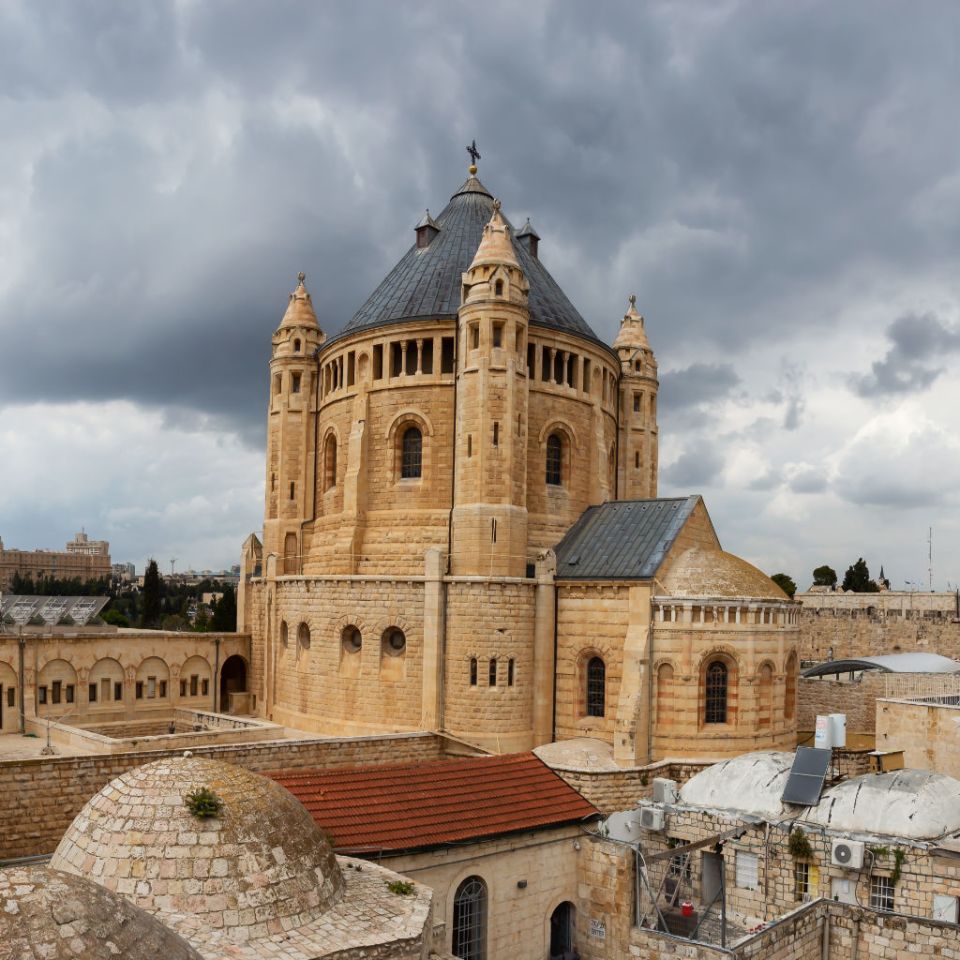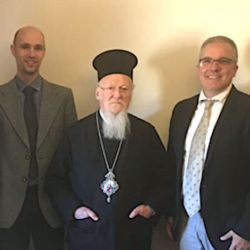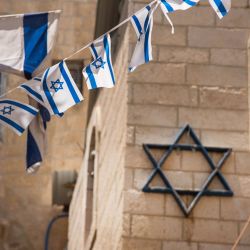We started with Father David Neuhaus, who is a Jesuit of Jewish origin and was, till the end of October, the vicar episcopal in the Latin Patriarchate of Jerusalem, responsible for Hebrew-speaking and migrant Catholics in Israel.
He welcomed us in the "Kehila” (the church) of the “St James Vicariate” in the neighbourhood near the town hall of Jerusalem.
When he heard about the project JC2033 he said: “It is the sense of joy which I find most touching. It was what strengthened my faith, which is inexplicable in this world of ours. There is nothing to be joyful in our region. On the contrary we have every reason to be pessimistic. Nevertheless, we are called on to be Gods’ witnesses of the Resurrection of Christ”.
 From left to right: Martin Hoegger, Olivier Fleury, David Neuhaus, Shafique Keshavjee
From left to right: Martin Hoegger, Olivier Fleury, David Neuhaus, Shafique Keshavjee
Pardon, the first gift of the Resurrection
He told us that this was first time that he discovers a project 16 years in advance. Usually it is two months beforehand! However, having so much time to prepare gives a sense of freedom. It encourages us to form a group including not only a great diversity of faiths, but also of cultural contexts: “Creating a large community with a common language. It’s a chance to be able to evolve together. Bring awareness that this year is an occasion to give thanks!”
For him the real challenge facing the Churches in the Holy Land is unity. The political situation is what divides them most. But the populace is conscious that the survival of the Christians here depends on their unity.
“God has sown faith on both sides. He expects us to create unity. If one believes in Christ’s resurrection, then what’s the difference? Jesus risen from the dead is our identity and our calling. Pardon was his first gift after the resurrection. Pardon is the fruit of the Holy Spirit’s life in us. I am touched when the Jews and the Moslems say to me that forgiveness is specific to Christianity”.
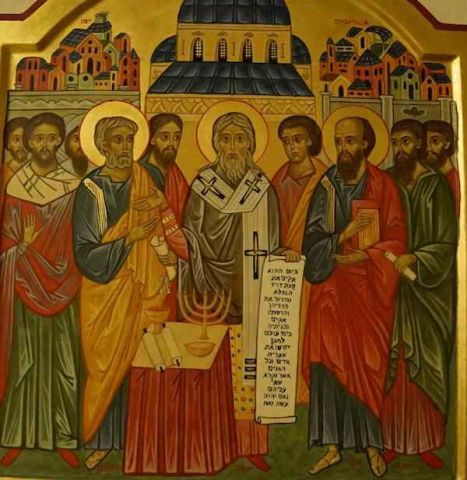 The Council of Jerusalem, icon in Hebrew, Church of the Catholic Hebraic community
The Council of Jerusalem, icon in Hebrew, Church of the Catholic Hebraic community
Unity, an essential value
A few steps away on the Jaffa road lies the shop of the Bible Society in Israel where Victor Kalisher, its general secretary, is awaiting us. I have known him for several years, having been myself the director of the Swiss Bible Society.
Unity in Christ is an essential value of the Bible Societies.
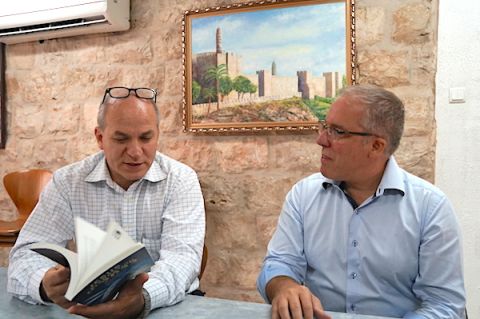 With Victor Kalisher, director of the Bible society
With Victor Kalisher, director of the Bible society
He said: “Christ sent on his disciples from Jerusalem to bring together the Jews and the believers of the nations”
The Bible Society is at the disposal of the whole population and therefore it is preparing Hebrew versions of the Bible. For 2033 V. Kalisher has in mind a booklet on the three years of Christ’s ministry.
But the most important thing for him is to ask for God’s advice on how to set up the event. He is grateful for the time allowing us to come to an agreement.
He concluded by saying that “We want to be true to the Gospel in showing our love to all, Israelis and Palestinians. One must not hesitate to ask the following questions: how can we be a blessing for everyone? How can we solve our problems, two thousand years after Christ’s Resurrection?”
Recognizing Jewish roots
We are having lunch with Dan Juster on the last floor of the “Notre Dame Center”, where there is a splendid view of the old city of Jerusalem. He is telling us how as a pastor of a congregation of the United Presbyterian Church in the USA, he had encountered Jews who believed in Jesus but who wanted to maintain their Jewish traditions. “This question had never crossed my mind. Little by little I became convinced of this. We started to include some Jewish elements into our liturgy. For me it was a revolution, being the son of a Jewish father and the pastor of a reformed church.”
He participated in the creation of the Jewish Messianic Movement and set himself up in Israel, where he is in charge of the Tikkun and Revive Israel movements.
On learning about the JC2033 project he gave us two pieces of advice: “build up a very strong prayer network, as you cannot make any progress without prayer! Don’t forget that the very first Church was comprised of Jews.”
Unity is his life’s passion: “God has told me that if I want to become a Messianic leader, then I must love the whole of his Church. I felt His love for all the churches. He did not show me the bad side of the churches, but only the good.”
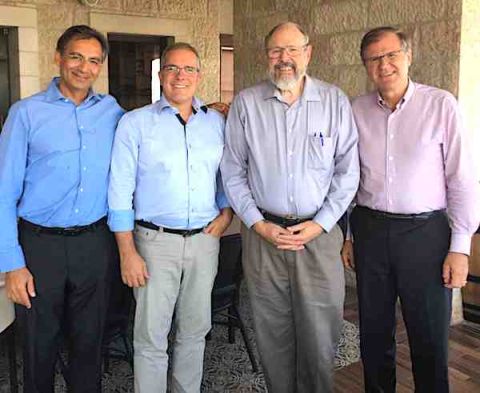 With Dan Juster.
With Dan Juster.
Pentecost 2033!
While Shafique Keshavjee and I were making another visit, Oliver Fleury encountered Wayne Hilsden, the founder of “King of Kings”, the largest Pentecostal Church in Jerusalem.
They had already met each other in 2014, and it was a great surprise for both of them. W. Hillsden was himself thinking on how to celebrate 2’000 years of Pentecost in 2033 to be linked with the great Pentecostal movement “Empowered21”.
Olivier said that “It took only a few minutes for us to behave like old friends sharing the progress of their projects”. During an exuberant evening service in a church full of worshipers, Wayne introduced us to Chad Holland, the new principal pastor of “King of Kings” and the son-in-law of Dan Juster whom we had just met.
Communion in the Holy Spirit
The following day we took a taxi to go to the village Ein Keren, the residence of Benjamin and Ruben Berger who are the two pastors of a Messianic community which assembles in Christ Church, near the Jaffa Gate. They were waiting for us together with Alona Kay who is in charge of the young. They come from an orthodox Jewish family which was decimated at Auschwitz, and they discovered Jesus as the Messiah of Israel more than 40 years ago while still living in the USA.
They became aware that the Church Fathers had modified the Church’s understanding of the Apostles. A Church composed of Jews and gentiles as indicated in the Letters to the Ephesians (2) and the Romans (9-11).
They said
“There are so many conferences in Jerusalem. The people living here are tired of that” and asked “will JC 2033 be just another event? Or will it bear fruit?”
For them the most important thing is to bond together within the Holy Spirit. This is the key to change our relationships.
“The true life lies in this communion as a witness to Christ’s resurrection. Let the shining light of the Christian’s presence bear witness to all and draw the Jews and the Moslems to the faith”.
On the way back, Alona Kay shared her enthusiasm for this project and said: “at present life is very difficult in Israel. The young are materialist. It really is sad to see that they have no need for the Messiah. That is why the way towards 2033 is so important. We don’t want to miss it and we would like to be part of it. I shall ask God to speak to me on the matter”.
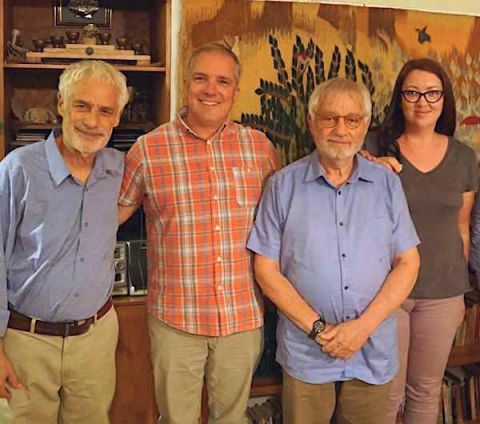 Ruben and Benjamin Berger and Alona Kay
Ruben and Benjamin Berger and Alona Kay
Some afterthoughts at the end of these chronicles
During our trip we found that there was an improvement in the relations between the heads of the historical churches. But on the other hand, there was a certain tension with some leaders of Evangelical churches and Jewish Messianic circles. The political, cultural, and religious complexity is a part of the day to day life.
We met people who were active in local ecumenism, and groups of wonderful young people trying to build bridges between each other.
We were also struck by the contrast between the rich churches and those of very modest means, such as the Ethiopian Orthodox church.
Jerusalem is a microcosm of an extreme ecclesiastical complexity covering major spiritual issues. How will God handle it in such a particular place?
Several people told us that the survival of the Christians in this region depends on their unity. Some of them saw immediately that the march on to 2033 will be a great stimulus to bring the Churches closer to each other.
We were glad to see so many doors opening to welcome us. We thus became more and more aware of this project’s potency.
We found that we often provoked a double surprise. Bringing a project to be realized in 16 years time. The younger the persons, the more they wanted to join up. Some of them liked the fact that it allows time for a communion to grow among them and so to find a common language. The way to 2033 is just as important as the event itself.
The second surprise is that JC 2033 puts Christ’s resurrection right into the centre. That touched the Christians of Jerusalem. It is the first time that they see a movement which places the resurrection of Jesus at the heart of an initiative.
Jerusalem is so central because it is where the Messiah’s resurrection took place, as predicted by the Prophets. It is the resurrection in the Holy Spirit proclaimed by the apostles which created the Church and constitutes its permanent unity.
We visited Jesus’s disciples in every church. The Resurrection is central, even though we sometimes perceived the weight of history. This is particularly striking in the Anastasis, the Church of the Resurrection where the Holy Sepulchre is located.
Let God make us feel his love for all the churches! May he give us to welcome the gifts he bestowed upon each church!
One experience which stands out in our minds: whenever we speak of our faith in Christ’s resurrection, one can have some most wonderful encounters, in spite of political or religious differences.
Jerusalem will certainly play an important role in 2033. We are well aware that our visits are just a small beginning. We shall no doubt come back!
Maybe we should find someone living in Jerusalem who could continue the visits to the Churches and the movements, and who will thus make the small mustard seed grow?
Those who have ears should hear!
Let the Holy Spirit enlighten and guide us! We are grateful for your precious prayers without which we would be unable to do anything.
Martin Hoegger

